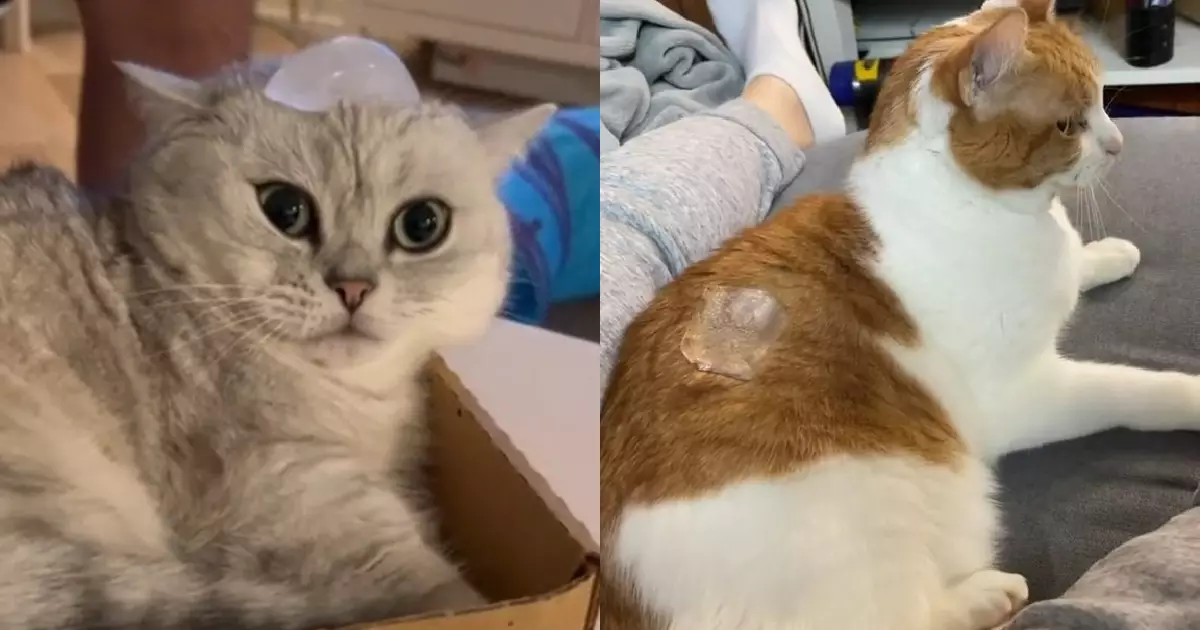Viral social media trends have taken the internet by storm, often bringing with them a wave of engagement and entertainment. TikTok, in particular, has become a hub for various challenges, with users constantly seeking unique content to capture the attention of their followers. Among these challenges is the infamous “put an ice cube on your cat” trend, where participants upload videos showcasing their cats in seemingly amusing situations. While the intent may be playful, this challenge raises pressing concerns about the well-being of our feline companions.
At first glance, placing an ice cube on a cat might seem harmless. Many videos depict cats reacting in a confused or indifferent manner, leading some to misinterpret their behavior as enjoyment. However, diving deeper into the psychology of our pets reveals a different narrative. While some cats may appear unaffected, many others experience anxiety and stress. The action of placing an ice cube on an unsuspecting cat parallels similar trends that have been deemed harmful, like the cucumber scare, which has caused distress to countless felines. If we were to humanize this situation, one could imagine the discomfort of an unexpected cold object being placed on one’s body—an experience that most would find jarring.
According to experts in animal behavior, the potential negative impacts of such challenges far outweigh the momentary entertainment they might provide. As JoAnna Puzzo, a feline welfare manager at Battersea Dogs and Cats Home, notes, “It could appear harmless but may agitate cats and cause them anxiety.” This highlights the disparity between human amusement and animal welfare. It is vital for pet owners to exercise empathy and foresight in understanding their pets’ reactions.
The emotional state of a cat is more complex than many might assume. Cats are creatures of habit, with established routines that provide them a sense of security. Surprising them with an ice cube is a violation of that stability, leading to confusion and discomfort. Dr. Alana Canupp, a veterinarian at BISSELL Pet Foundation, warns that such actions threaten the human-animal bond, suggesting they can result in redirected aggression. This could manifest as swiping or biting, reactions borne out of fear or distress rather than playfulness.
Furthermore, Claire Haynes, an animal behaviorist with Blue Cross UK, reinforces the message that pet owners must craft a safe and nurturing environment. When pursuing entertainment, owners should meticulously consider their pets’ perspectives, asking themselves if the scenario truly respects their cat’s comfort and safety. By failing to do so, owners inadvertently shift the dynamic of companionship to one of stress and anxiety.
If the goal behind the ice cube challenge is to help cats stay cool during sweltering summer months, there are more humane alternatives. Dr. Anna Foreman, an in-house veterinarian for Everypaw, recommends a more thoughtful approach: present ice cubes in a bowl, allowing your cat to engage with the object on their terms. Cats are typically adept at self-regulation in hot weather and do not require coercive cooling methods like those that involve surprising them with ice.
Instead of participating in viral trends that could have adverse effects, cat owners should seek ways to celebrate their pets while prioritizing their well-being. Creating interactive environments where pets can explore or engage with novel items without fear is not only more rewarding but also strengthens the bond between owner and feline.
In a world increasingly defined by social media influence, it falls upon pet owners to act responsibly regarding the trends they endorse. While the allure of virality can be compelling, it is essential to prioritize the emotional and psychological welfare of our pets. The “put an ice cube on your cat” challenge is but one example of a trend that, rather than uniting, risks alienating our beloved companions through fear and stress. As stewards of our pets’ health, let us challenge ourselves to seek laughter and love in ways that do not compromise their happiness. Let’s create moments of joy that keep our furry friends safe and sound, fostering true companionship rather than temporary amusement.


Leave a Reply